Last-Minute NYC Holiday Gift Guide 🎁
We’ve created a holiday gift guide with presents for the intrepid New Yorker that should arrive just in time—


Amongst the marble busts of the Metropolitan Museum of Art‘s Greek and Roman wing, an exhibit dedicated to the musical movement that rocked the world now greets visitors of the museum this spring. “Play it Loud” is the first art exhibit of its kind to focus exclusively on the instruments of rock and roll. It opens to the public on April 8 and will showcase an astonishing collection of iconic instruments that defined the development of one of the twentieth century’s most beloved genres. Spanning in time from Chuck Berry’s Gibson and the birth of rock and roll to Lady Gaga’s custom made piano, the exhibit celebrates the history and power of rock and roll within the hallowed walls of one of the largest art collections in the world.
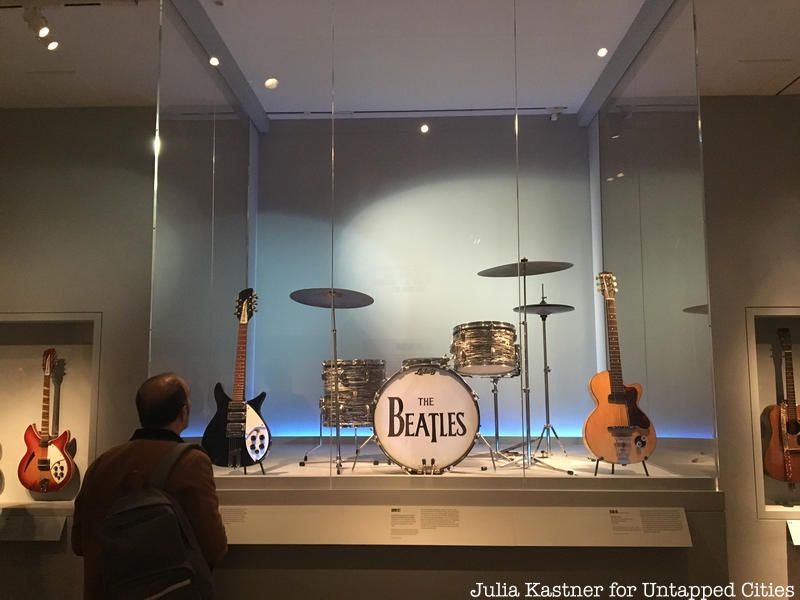
Putting together a rock and roll exhibit at the Metropolitan Museum of Art was no easy task. Director Max Hollein reflected at the press preview for the exhibition on April 1st that, “Pitching an exhibition about Rembrandt or Michelangelo or Greek sculpture—that’s pretty easy, but pitching an idea about the instruments of rock and roll is a bit more complicated.” Indeed, once the exhibition had been approved, asking the world’s most famous musicians to give up their beloved instruments was similarly challenging. The scope and mission of the exhibition, however, changed many rockstars’ minds. Jimmy Page explained his own doubts during the press preview, but then recalled, “Then they laid out the plan of the exhibit and explained to me that you’ll walk through Greek and Roman statues in the galleries and then you’ll see Chuck Berry’s guitar standing there a
nd I said, ‘Okay, what do you want?’”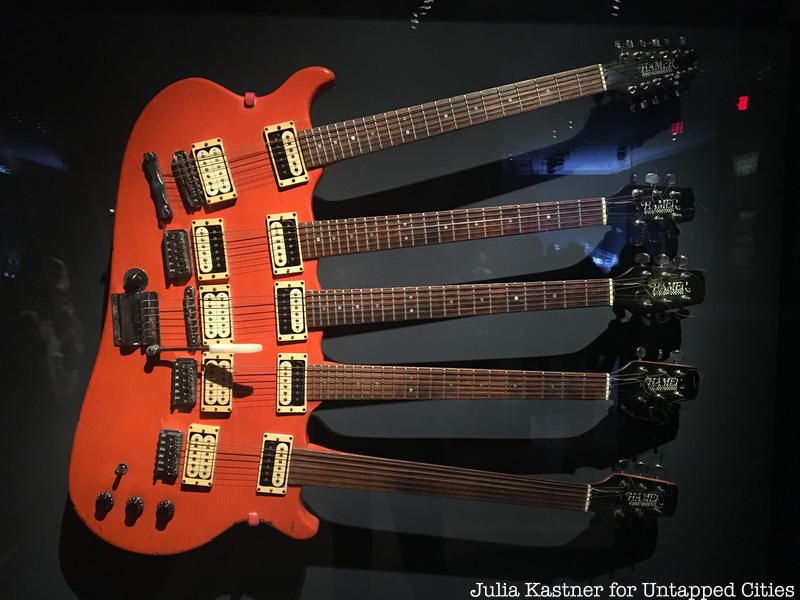
The exhibit itself is impressive not only for the iconic nature of the instruments donated, but also for the variety and structure of the installation. It begins with instruments that paved the way for rock, such as Muddy Waters’ telecaster and the original Fender stratocaster and Gibson models. Guitars that defined the artists that played them astonish the exhibition’s audience next. Included within the exhibit are pieces such as Eric Clapton’s “Blackie”, Van Halen’s “Frankenstrat” (so-called due to the host of parts Van Halen took from other electric guitars) and George Harrison’s signed guitar. It also includes instruments made famous through specific performances and songs. The famous double-necked guitar Don Felder uses to play the Hotel California solo, as well as the guitar Aerosmith used to record “Walk this Way” and Steve Miller’s “The Joker” guitar, all now reside in the museum.
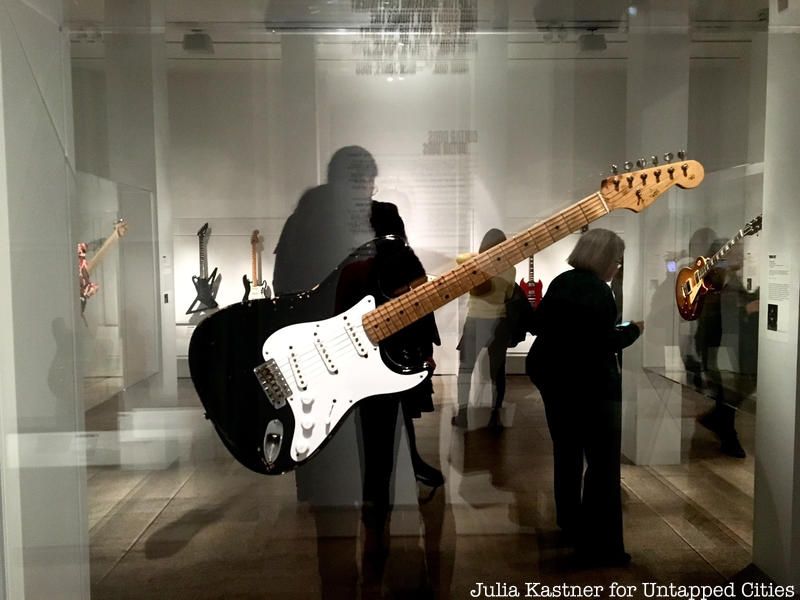
Eric Clapton’s famous electric guitar, “Blackie”
Unique additions to the exhibition also include some of rock and roll’s most famous destroyed instruments, such as the guitar burned by Jimi Hendrix at a sacrificial fire at the Monterey Pop Festival and the Gibson smashed by none other than Peter Townshend preserved in Lucite. Instruments also not necessarily deemed rock instruments by many are also included, such as a Rolling Stones violin and the sitar used by Ravi Shankar in his performances in the West, shows that greatly influenced Western artists, from John Coltrane to the Beatles.
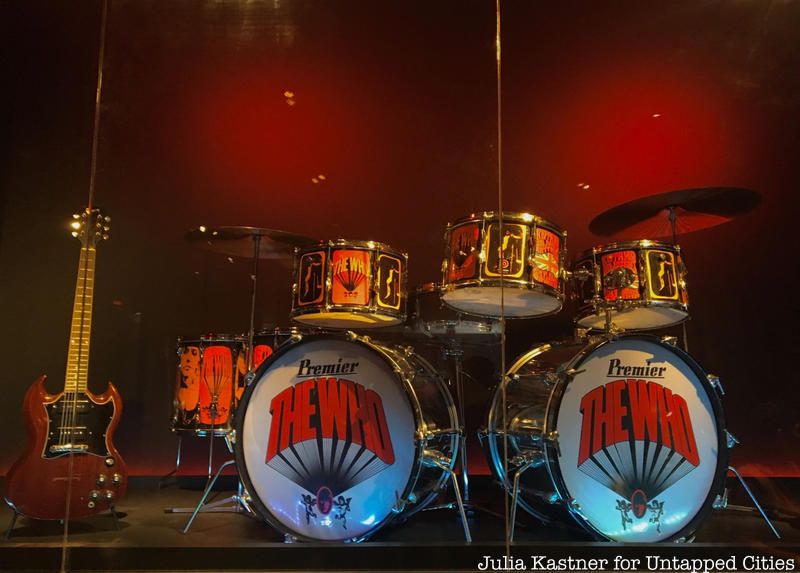
The exhibit also varies the mediums through which it tells the story of rock and roll. Classic rock hits play from speakers throughout the installation, many of which are songs played using the instruments in that very room. One part informs viewers of the instruments presented by having the artists themselves explain their significance on TVs above the display. As the exhibit nears its end, a room consisting of only a projector and seating plays live performances from Joan Jett, Van Halen, and Eric Clapton. Walk in to the next room, and the same guitar used by Clapton in the concert video stands separated from you by only a thin layer of glass.
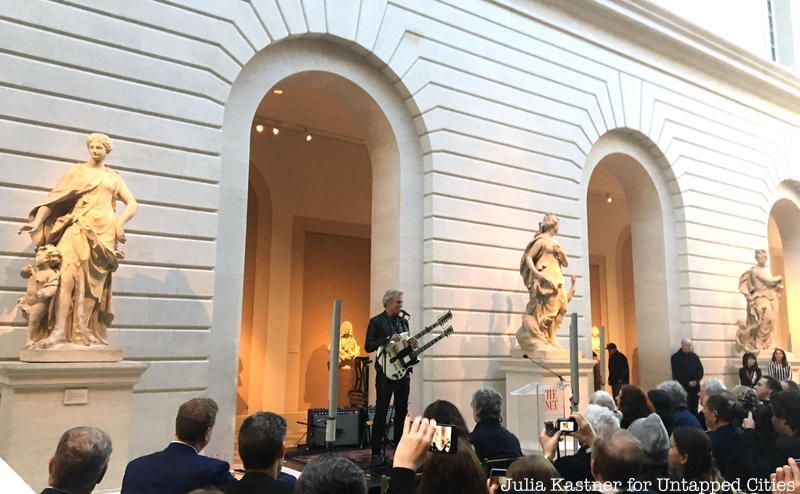
Don Felder of the Eagles at the exhibition’s press preview
The exhibit spills its audience out in to a room filled with more Greco-Roman art, creating the fantastic contrast of twentieth century rock with art that is part of ancient history. It was in this room that rockstars Jimmy Page, Steve Miller, Tina Weymouth, and Don Felder spoke to the press about the upcoming exhibit, describing their own emotional reactions to its opening. Don Felder in particular spoke pensively about how he first arrived to New York with only a bag and a guitar in hand in 1968, and visited the Metropolitan Museum of Art on his second day in the city.
To have the instruments of a musical movement so often seen as alternative and rebellious honored in a “cathedral of art” according to Rock and Roll Hall of Fame president Greg Harris, was emotional for all of the famous musicians present. The press preview ended with Don Felder wielding his famous double-necked guitar for an unforgettable performance of the iconic Hotel California solo — sandwiched between two marble busts from ancient history, his performance represented not only a wonderful contrast in the forms of art, but in the Met’s commitment to showcasing the diverse range of art that has transformed the world.
“Play it Loud” opens April 8th and will run until October 1st at the Met Fifth Avenue.
Next, check out the Top 10 Secrets of the Metropolitan Museum of Art and the 13 New Outdoor Art Installations to See in NYC This Month, including new work coming to the Met Museum rooftop.
Subscribe to our newsletter